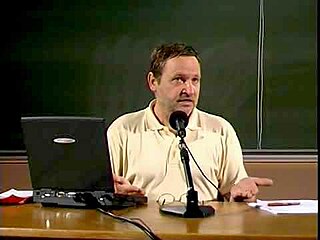In logic and proof theory, natural deduction is a kind of proof calculus in which logical reasoning is expressed by inference rules closely related to the "natural" way of reasoning. This contrasts with Hilbert-style systems, which instead use axioms as much as possible to express the logical laws of deductive reasoning.
Deductive reasoning is the mental process of drawing valid inferences. An inference is valid if its conclusion follows logically from its premises, meaning that it is impossible for the premises to be true and the conclusion to be false.
Proof theory is a major branch of mathematical logic and theoretical computer science within which proofs are treated as formal mathematical objects, facilitating their analysis by mathematical techniques. Proofs are typically presented as inductively-defined data structures such as lists, boxed lists, or trees, which are constructed according to the axioms and rules of inference of a given logical system. Consequently, proof theory is syntactic in nature, in contrast to model theory, which is semantic in nature.
Relevance logic, also called relevant logic, is a kind of non-classical logic requiring the antecedent and consequent of implications to be relevantly related. They may be viewed as a family of substructural or modal logics. It is generally, but not universally, called relevant logic by British and, especially, Australian logicians, and relevance logic by American logicians.
In philosophy of logic and logic, a rule of inference, inference rule or transformation rule is a logical form consisting of a function which takes premises, analyzes their syntax, and returns a conclusion.
In mathematical logic, sequent calculus is a style of formal logical argumentation in which every line of a proof is a conditional tautology instead of an unconditional tautology. Each conditional tautology is inferred from other conditional tautologies on earlier lines in a formal argument according to rules and procedures of inference, giving a better approximation to the natural style of deduction used by mathematicians than to David Hilbert's earlier style of formal logic, in which every line was an unconditional tautology. More subtle distinctions may exist; for example, propositions may implicitly depend upon non-logical axioms. In that case, sequents signify conditional theorems in a first-order language rather than conditional tautologies.
In mathematical logic, a sequent is a very general kind of conditional assertion.
In programming language theory and proof theory, the Curry–Howard correspondence is the direct relationship between computer programs and mathematical proofs.

Jean-Yves Girard is a French logician working in proof theory. He is a research director (emeritus) at the mathematical institute of University of Aix-Marseille, at Luminy.
In logic, the semantics of logic or formal semantics is the study of the semantics, or interpretations, of formal languages and natural languages usually trying to capture the pre-theoretic notion of logical consequence.
Proof-theoretic semantics is an approach to the semantics of logic that attempts to locate the meaning of propositions and logical connectives not in terms of interpretations, as in Tarskian approaches to semantics, but in the role that the proposition or logical connective plays within a system of inference.
Dag Prawitz is a Swedish philosopher and logician. He is best known for his work on proof theory and the foundations of natural deduction.
In mathematical logic, structural proof theory is the subdiscipline of proof theory that studies proof calculi that support a notion of analytic proof, a kind of proof whose semantic properties are exposed. When all the theorems of a logic formalised in a structural proof theory have analytic proofs, then the proof theory can be used to demonstrate such things as consistency, provide decision procedures, and allow mathematical or computational witnesses to be extracted as counterparts to theorems, the kind of task that is more often given to model theory.
In mathematics, Takeuti's conjecture is the conjecture of Gaisi Takeuti that a sequent formalisation of second-order logic has cut-elimination. It was settled positively:
In logic, especially mathematical logic, a Hilbert system, sometimes called Hilbert calculus, Hilbert-style deductive system or Hilbert–Ackermann system, is a type of system of formal deduction attributed to Gottlob Frege and David Hilbert. These deductive systems are most often studied for first-order logic, but are of interest for other logics as well.
Peter Pagin is Professor of Philosophy at Stockholm University. He is a specialist in the philosophy of language and has worked extensively on foundational issues in semantics and on technical and philosophical problems about the compositionality of meaning.
Dag is a masculine Scandinavian given name derived from the Old Norse dagr, meaning "day", most commonly used in Norway and Sweden. In Sweden, September 16 is Dag's Name Day. Dag is uncommon as a surname. People with the name Dag include:
In mathematical logic, a judgment or assertion is a statement or enunciation in a metalanguage. For example, typical judgments in first-order logic would be that a string is a well-formed formula, or that a proposition is true. Similarly, a judgment may assert the occurrence of a free variable in an expression of the object language, or the provability of a proposition. In general, a judgment may be any inductively definable assertion in the metatheory.
Prawitz is a surname. Notable people with the name include:

